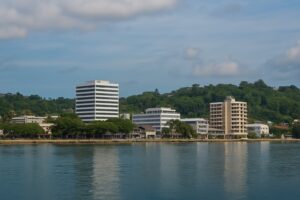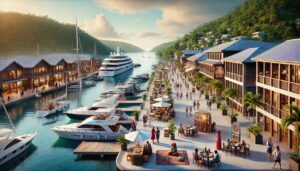Waves of Change: How the OSMOSUN Initiative is Transforming Water Access and Sustainability in Vanuatu
This article provides an in-depth look at the groundbreaking OSMOSUN initiative in Vanuatu, which has introduced solar-powered desalination units to tackle the persistent challenge of accessing clean water. With an emphasis on sustainability and innovation, this effort not only addresses immediate water scarcity issues but also sets a precedent for future environmental and technological solutions in the region.
Overview of the OSMOSUN Initiative
Launched on September 19, 2024, the OSMOSUN project has successfully installed six solar-powered desalination units across Vanuatu, aiming to supply clean drinking water to about 5,000 residents in four different locales. This initiative is particularly crucial for Vanuatu, a nation where many communities face acute water shortages exacerbated by environmental challenges.
The choice of solar-powered technology aligns with Vanuatu’s broader environmental goals, utilizing the abundant solar energy available in the region to operate the desalination units sustainably.
Community Impact and Benefits
The deployment of these units promises substantial improvements in the quality of life for many Vanuatuan communities. Reliable access to clean water reduces the prevalence of waterborne diseases and the overall time spent by individuals, particularly women and children, in water collection. Consequently, this contributes significantly to enhancing community health standards and allows more time for educational and economic activities.
Technological and Environmental Benefits
The technology behind OSMOSUN’s desalination units offers significant advantages. Operated by solar power, these units ensure an eco-friendly solution to water scarcity, minimizing reliance on non-renewable energy sources and supporting Vanuatu’s low-carbon initiatives. Additionally, the systems are designed for low maintenance, which is essential in remote or less accessible regions, ensuring long-term sustainability and reliability.
Implications for Regional Development
The successful implementation of the OSMOSUN initiative in Vanuatu serves as a viable model for other Pacific islands and similar environments worldwide. It exemplifies how innovative solutions and public-private partnerships can effectively address critical infrastructure needs. Moreover, it highlights the potential for scalable projects that can be adapted to different geographies with similar challenges.
Key Data Points
- Number of Units Deployed: 6
- Beneficiaries: Approximately 5,000 residents
- Locations Served: Four locations across Vanuatu
- Technology: Solar-powered desalination
- Environmental Impact: Reduction in carbon footprint
- Maintenance: Low maintenance requirements
- Health Outcomes: Decrease in waterborne diseases
Relevant URLs
For further information on the OSMOSUN initiative and its impact on water access in the South Pacific, please visit:
Conclusion
The introduction of solar-powered desalination units through the OSMOSUN initiative is a landmark achievement for Vanuatu, enhancing access to clean water and supporting sustainable development. This initiative not only solves an immediate need but also provides a blueprint for addressing similar challenges globally, showcasing the power of innovative, sustainable technology in improving lives.











